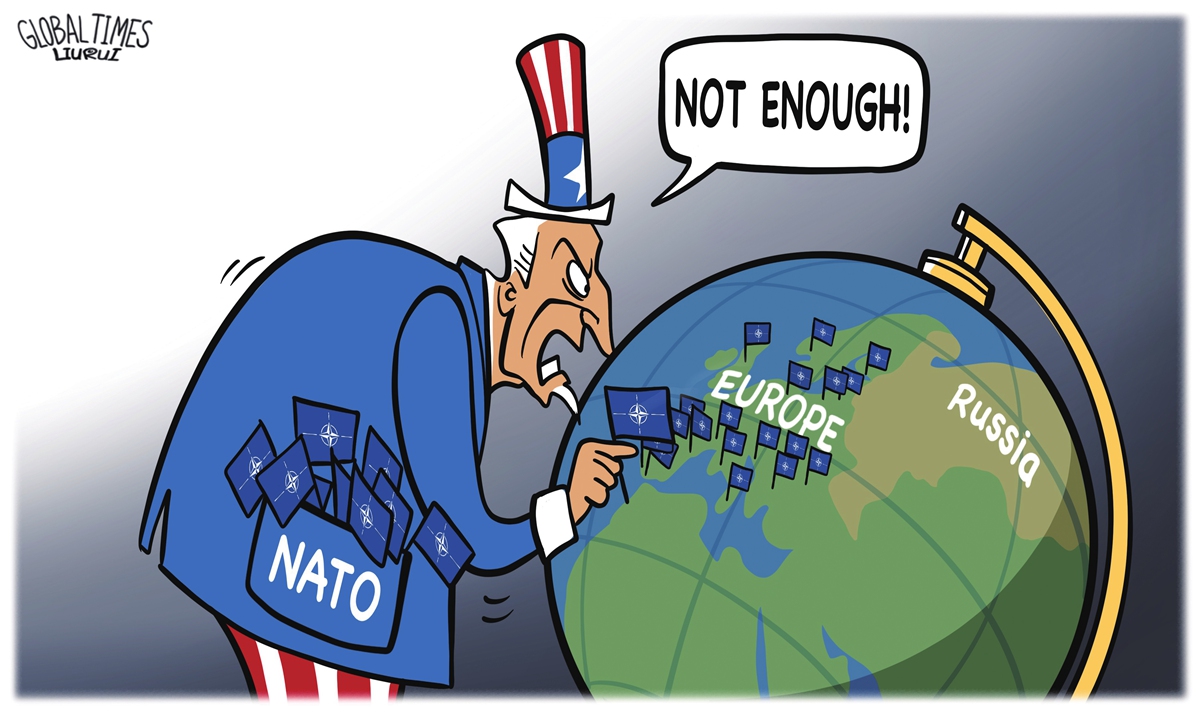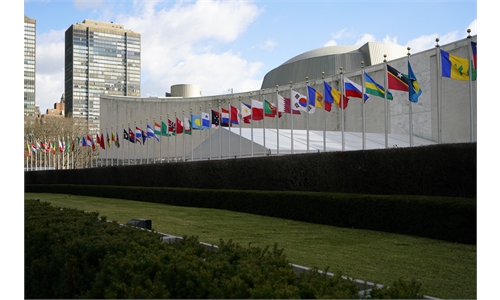
Illustration: Liu Rui/GT
The ongoing Russia-Ukraine conflict appears to be a confrontation between Russia and Ukraine, but it mirrors the Western civilization' crisis of expansion. This crisis stems from the inherent duality of Western civilization - the West can only accept the existence of its homogeneity, and the non-homogeneous is either assimilated or judged as foes that need to be eliminated.
Russia was largely shaped as an opponent by the US and the West through the eastward expansion of NATO. The reason why Russia is portrayed as a rival can be partly attributed in Russia's Orthodox beliefs, previous communist ideology, multi-ethnic unity and its vast geographic territory. All these make the West feel that Russia cannot be assimilated. As a result, the West believes it can only treat Russia as an enemy.
The absurdity of the duality of Western civilization lies in the fact that the standard of homogeneity is variable, but the essence of the need for adversaries is constant. This characteristic tends to make conflict a necessity. NATO is a military organization created to fight the Soviet Union with the goal to "keep the Soviet Union out, the Americans in, and the Germans down." But after the collapse of the Soviet Union, NATO, which lost its significance of existence, continued to absorb member countries that were once part of the Soviet Union. Such a practice was considered as a provocation to Russia.
After the collapse of the Soviet Union, Russia carried out corresponding democratic reforms, and at the same time made efforts to improve its image on the global stage, preventing NATO from openly treating it as an enemy. The bloc, bereft of its biggest imaginary enemy, would turn its focus to issues such as terrorism, energy security, cyberattacks and the proliferation of weapons of mass destruction. But without a fixed imaginary enemy, it is difficult to make NATO united, and the bloc's influence is in decline. The Russia-Ukraine conflict is undoubtedly a fillip to NATO.
The logical starting point of Western international relations theory is the "Thirty Years' War" (1618-1648), when a series of wars between various Protestant and Catholic states took place and the principle of state sovereignty emerged, namely the Westphalian system. The history of international relations and world history present different value judgments. Research on world history shows that a common misconception is that the Treaty of Westphalia brought peace by excluding religion from politics. Although the Treaty of Westphalia advanced secularization in the long run, it was not a fully secular treaty.
International relations theory reviews the Treaty of Westphalia from a positive perspective, and later has not talked about its Christian background at all. This is because international relations have become the product of the expansion of Christian civilization. The West did not encounter religious opponents for some time, but only the power transfer within the Christian world. After the end of the Cold War, US scholar Samuel Huntington put forward the "Clash of Civilizations," worried about the threat posed by the revival of Confucian and Islamic civilizations to Christian civilization.
It is conceivable that Western civilization will create conflict after conflict in the future because of its constant need for enemies. In particular, under the logic of the disorderly expansion of capital and the worship of technology, the US, with the DNA of Protestant fundamentalism and white supremacy, is shifting crises and creating contradictions instead of reforming itself and adapting to great changes unprecedented in a century by creating the narrative of "democracy vs autocracy."
A belligerent country, however big it may be, will perish. A civilization that lives by shaping foreign enemies and grows by dealing with them will eventually decline. This is a reality that we can see increasingly clearly when we observe the ongoing Russia-Ukraine conflict as well as many wars that the US incited or participated in.
Wang is vice director of the Academy of Xi Jinping Thought on Socialism with Chinese Characteristics for a New Era, Renmin University of China (RUC). Liao is PhD candidate at the institute of international affairs, RUC. opinion@globaltimes.com.cn

